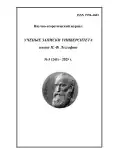THE STUDY OF THE IMPACT OF SPECIALIZED STATUS OF A SCHOOL CLASS ON THE WELL-BEING OF STUDENTS (BASED ON THE EXAMPLE OF THE YUNARMIYA MOVEMENT)
- Authors: Kuznecov D.A.1, Nikolaeva A.A.1
-
Affiliations:
- Moscow State University of Psychology & Education
- Issue: No 5 (2025)
- Pages: 284-291
- Section: Educational psychology, psychodiagnostics of digital educational environments
- URL: https://bakhtiniada.ru/1994-4683/article/view/299774
- DOI: https://doi.org/10.5930/1994-4683-2025-284-291
- ID: 299774
Cite item
Full Text
Abstract
The purpose of the study is to examine the impact of the specialized status of a school class (using the example of the Yunarmiya movement) on the psychological well-being of students.
Research methods and organization. The questionnaire developed by Bochaev, Korneev, and Khlomov was used to assess subjective insecurity, antisocial behavior, and the well-being of students at school. The study involved 30 students, evenly distributed between the Yunarmiya and regular classes.
Research results and conclusions. It has been established that students in the Yunarmiya class exhibit a lower level of antisocial behavior, but a higher level of perceived insecurity. Simultaneously, the level of school well-being has proven to be identical for both groups. The specialized status of the class may have both positive and negative effects on the psychological well-being of the students. An increased focus on discipline in specialized classes does not always contribute to their perceived safety.
Research methods and organization. The questionnaire developed by Bochaev, Korneev, and Khlomov was used to assess subjective insecurity, antisocial behavior, and the well-being of students at school. The study involved 30 students, evenly distributed between the Yunarmiya and regular classes.
Research results and conclusions. It has been established that students in the Yunarmiya class exhibit a lower level of antisocial behavior, but a higher level of perceived insecurity. Simultaneously, the level of school well-being has proven to be identical for both groups. The specialized status of the class may have both positive and negative effects on the psychological well-being of the students. An increased focus on discipline in specialized classes does not always contribute to their perceived safety.
About the authors
Dmitriy Alekseevich Kuznecov
Moscow State University of Psychology & Education
Email: kuznetsov.m2002@yandex.ru
Alla Alekseevna Nikolaeva
Moscow State University of Psychology & Educationcandidate of sociological sciences
References
- Савченко И. А., Николаева А. А. Модели политической социализации в контексте патриотического воспитания в современной российской школе. doi: 10.34835/issn.2308-1961.2023.05.p337-342 // Ученые записки университета им. П. Ф. Лесгафта. 2023. № 5 (219). С. 337–342. EDN: ILSAZZ.
- Хрипакова М. Л., Торгашина Е. Ю. Роль юнармии в воспитании подрастающего поколения // Инновационная наука. 2023. № 12-1. С. 194–196. EDN: ZMNIYG.
- Акасевич О. И., Панченко Н. В. Школьный климат как фактор повышения качества образования в современной общеобразовательной организации. doi: 10.55523/27822559_2022_4(8)_22 // Педагогическая перспектива. 2022. № 4 (8). С. 22–29. EDN: YWSJFK.
- Бочавер А. А., Корнеев А. А., Хломов К. Д. Опросник поведенческих норм и школьного климата. doi: 10.17323/vo-2023-16321 // Вопросы образования. 2023. № 4. С. 55–84. EDN: XILBTT.
Supplementary files








